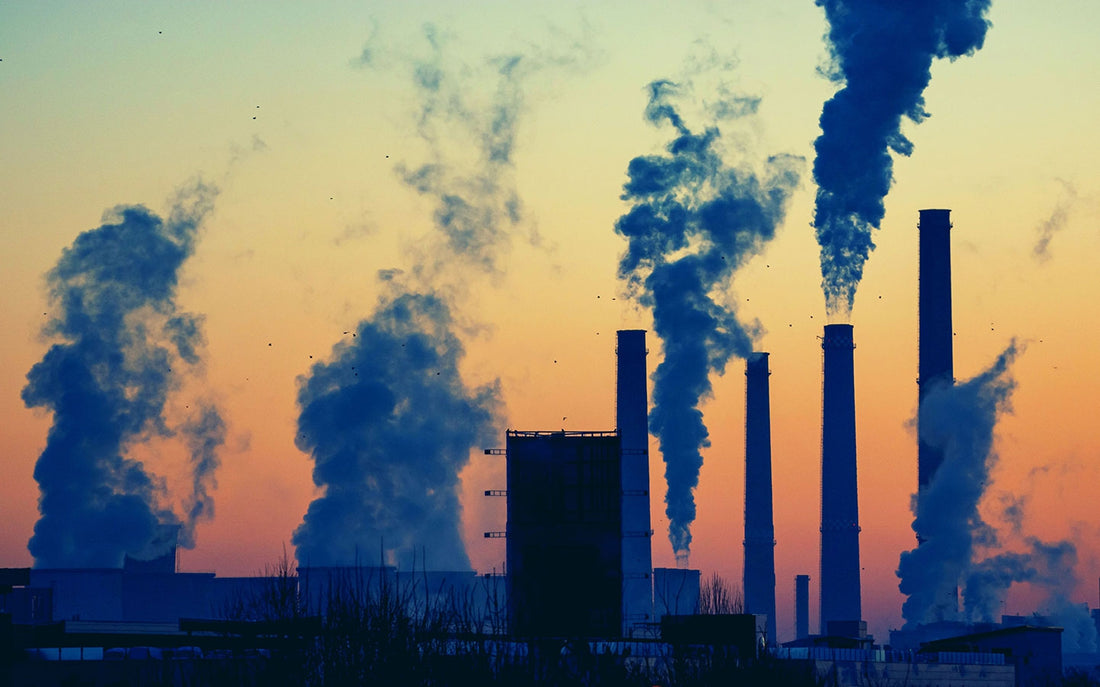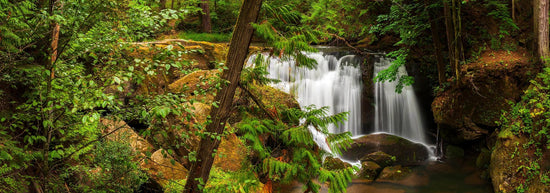At the October 7th Vice Presidential debate, Mike Pence announced that we’ve never lived in a cleaner, greener environment. He claimed that President Trump has made serious advancements on environmental policy and that the United States has reduced more greenhouse gas emissions than any other country in the Paris Agreement.
The truth is, we don’t live in the cleanest version of Earth we’ve ever seen. We’ve pushed our natural world to the brink of collapse, and climate change is a real and imminent threat.
What has really happened during the last few years is that the Trump administration has been working to undo a lot of the advancements the United States has made for the environment. Since President Trump took office, he’s called for one hundred rollbacks on environmental policies.
We often get asked why we take such painstaking measures to ensure we’re a green, sustainable company. Well, the onus to fight for a healthy planet and future families is falling more on the good will of big businesses. With 100 companies contributing to over 70% of the global carbon emissions, it’s important that we vote with our dollar as both businesses and patrons.
Here’s the top 20 environmental rollbacks that we’re the most concerned about:
1. Weakened Obama-era auto pollution rules and greenhouse gas standards for passenger cars and light trucks.
Transportation is a huge contributor to climate change, accounting for almost a third of greenhouse gas emissions. Loosening the rules around standards for cars we’re putting on the roads every day is a major hit. The new rule would allow cars to emit nearly a billion tons more carbon dioxide over the lifetime of a vehicle than the existing rule did.
2. Withdrew mercury rule for coal-fired power plants
In spring 2020, the administration withdrew the rule that required coal-fired power plants to cut their mercury emissions. Mercury can harm pregnant women and causes developmental problems in young children. Withdrawing this rule benefits power polluters at the expense of our children’s health.
It’s also worth noting that coal plants are disproportionately located near communities of color, which is actively killing black people, other minorities, and those with low income.
3. Cancelled a requirement for oil and gas companies to report methane emissions
Despite all the recent extreme weather events, Trump rescinded regulations on methane, a gas that’s known as a huge contributor to climate change. It’s the second-largest contributor to human-caused global warming and is much stronger than carbon dioxide.
Methane traps ninety times more heat in the atmosphere than carbon dioxide does. Fracking to export gas and oil has been a big contributor to the recent increase in methane levels, which have increased by 5 millions tons each year since 2000.
4. Repealed regulations for methane leaks on tribal and public lands
The Obama administration had moved to limit methane leaks caused by intentional venting and flaring at energy production sites. This rollback changed the regulation so that these facilities only need to be inspected once a year.
This is like if you only had to clean your house when your grandparents came over; except instead of your house, it’s toxic cancer-causing fumes, and instead of your grandparents, it’s inspectors who couldn’t really do anything about the deadly chemicals if they wanted.
5. Lifted controls on toxic air pollution with Clinton-era Clean Air Act
The lift of key controls in the Clean Air Act means significant polluters will be held to lower standards. The new downgrade is deregulating major sources of toxic air pollution that are known to cause cancer and birth defects. Because of this change, some facilities would become completely unregulated.
6. Relaxed regulations on waste from coal plants

These relaxed regulations on coal plants could prolong the risk of toxic spills and drinking water contamination. It eases restrictions on coal ash (a residue laced with heavy metals, arsenic, and mercury) and wastewater from coal plants. These contaminants leak into nearby groundwater.
A report from the Environmental Integrity Project found that 90% of sites that store coal ash are leaking levels of contamination that exceed EPA standards. As we mentioned above, this drastically impacts people of color and poor communities rather than the affluent white communities who are promoting the coal industry.
7. Stopped payments to the Green Climate Fund
The little-known Green Climate Fund is a UN project that helps raise funds for lower-income countries to reduce carbon emissions. Trump’s decision to stop payments cut $2 billion from the expected fund.
8. Retracted rules meant to reduce the leaking of hydrofluorocarbons into the atmosphere
The retraction of these rules relaxed requirements of owners and operators of refrigeration equipment to have detection and maintenance programs for hydrofluorocarbons (HFCs). HFCs are referred to as “climate super-pollutants” because they’re absolutely terrible for the environment and contribute highly to the deterioration of the ozone layer.
9. Revoked an executive order from Obama administration to reduce greenhouse gas emissions by 40% over 10 years
The Obama-era order required federal agencies to develop plans to reduce emissions as well as report on their progress. President Trump’s new order gets rid of all target goals and vaguely directs agencies to act in a manner that “increases efficiency and protects the environment”. Many experts see the 40% goal as lacking to start with, so allowing more emissions is only accelerating our race to the end of the sixth extinction.
10. Reversed the Stream Protection Rule
The Stream Protection Rule was formed to protect the nation’s waterways from pollution generated from surface mining. The rule would keep coal mining debris out of 6,000 miles of streams and 52,000 acres of forests.
If we could trust coal companies to do their due diligence and keep dangerous debris out of waterways, then we wouldn’t have needed the Stream Protection Rule to begin with.
11. Revived banned hunting techniques for extreme sport hunting on millions of acres in Alaska

Source: Global News
The release of this ban allows for controversial sport hunting measures to take place. Examples include baiting grizzly bears with donuts soaked in bacon grease, spotlights that blind mama bears, and shooting caribou from motorboats. This new rule allows extreme killing techniques, including the killing of cubs, on 20 million acres of national preserves in Alaska.
12. Changed rules on the National Environmental Policy Act
One of the country’s most important environmental laws was subjected to new rules that expedite construction permits while shortening the timeframe for the completion of environmental studies. This rollback also limited which types of projects are subject to review and revoked the requirement for federal agencies to account for a project’s effect on the environment and climate change.
13. Withdrew an order to consider climate change in natural resource management in national parks
Many of our national parks are under threat from rising seas, floods, and wildfires. In order to protect them, we have policies set up that are backed by science. The previous order took environmental and societal changes into account to protect America’s parks. Trump’s order rescinds science-based decision making in the welfare of national parks.
14. Rolled back clean water protections for tributaries and wetlands
Scaling back on the Clean Water Act set up by the Obama administration means industrial pollution can flow more freely into waterways. The Obama regulation had put limits on which chemicals could be used near streams, wetlands, and other bodies of water. It was designed to protect drinking water sources for about one third of the U.S.
The new measure allows polluters to discharge harmful substances into waterways without a permit.
15. Limiting pesticide safety zones
Smack in the middle of the pandemic while farmworkers are considered essential workers, the EPA proposed dropping the rule to ensure safety zones while pesticides are being sprayed. Not only is this inhumane, it also endangers the assurance of maintaining a working food system.
Farmworkers have a 145 times higher rate of exposure-related illness than other workers do. Current regulations to ensure the safety of pesticide application are minimal and pesticide drift is common, exposing workers to toxic chemicals. In many cases, those most affected by these policies are minority and low-income populations, many of which don’t have access to health care.
16. Lifted ban on drilling in the Arctic Wildlife Refuge

Source: Alaska Public Media
Lifting the ban on Arctic oil drilling is among a slew of rollbacks designed to unleash fossil fuel production on public lands and waterways and create more offshore energy. The executive order also calls to reexamine seismic testing where it was formerly not allowed and refrains from designating any new marine sanctuaries.
17. Repealed rule on water pollution regulations for fracking on federal and tribal lands
The original rule would have required companies to be transparent about what chemicals they’re using for fracking, cover surface ponds that contain fracking fluids, and set construction standards for wells. The withdrawal of this rule means fracking companies don’t have that accountability or responsibility.
18. Retracted an Obama-era policy on protecting oceans and the Great Lakes
In 2010, President Obama issued an executive order following the Deepwater Horizon oil spill in the Gulf of Mexico. The spill, which was the largest offshore oil spill in U.S. history, highlighted the vulnerability of marine environments. Workers were killed, millions of gallons of crude oil entered the ocean, wildlife was harmed, and tourism and fishing industries were crushed.
The Trump administration replaced this executive order in 2018 with a new approach that uses waters to promote economic growth.
19. Permitted the use of seismic surveys for gas & oil exploration
The use of seismic air guns to discover oil and gas formations in the Atlantic Ocean was blocked by the Obama administration. These guns can disturb and kill marine life like whales and sea turtles and disrupt fisheries.
Part of President Trump’s bid to expand offshore drilling, these practices haven’t been conducted in the region for over thirty years. Seismic surveys send intense blasts of compressed air into the seabed every 10 to 12 seconds for weeks or months at a time, putting endangered marine life at risk.
20. Dismantled offshore drilling safety regulations
The same major oil spill that caused President Obama to enact a policy to protect U.S. oceans also inspired safety rules for offshoring drilling. These rules are believed to have prevented a repeat of the costly accident. But in May 2019, Trump eased these regulations. The new rule requires less frequent testing of equipment and more time in between inspections.
Many believe this change will put workers, wildlife, and waterways at serious risk.
We have the facts and we’re seeing the impact all around us. The environment needs us now more than ever, and voting is one of the most important things we can do to secure our future planet.
Make your voice heard and please vote!
Make sure you’re registered to vote and find your local polling place or make a plan to mail your ballot in. Then, use this tool to track your ballot according to your state and make sure it’s been counted. Here’s a few other ways to know your vote counts this year.





